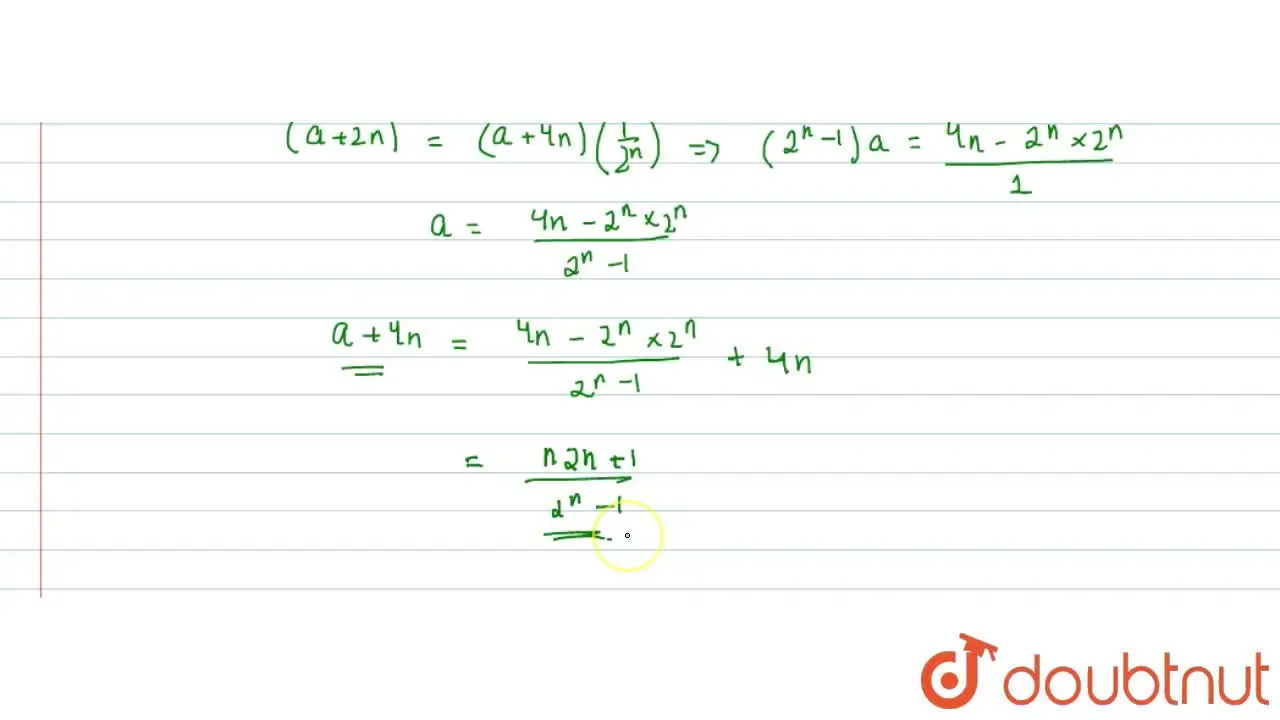There are 4n+1 terms in a sequence of which first 2n+1 are in Arithmetic Progression and last 2n+1 are in Geometric Progression the common difference of Arithmetic Progression is 2 and common ratio of Geometric Progression is 12. The middle term of the Arithmetic Progression is equal to middle term of Geometric Progression. Let middle term of the sequence is Tm and Tm is the sum of infinite Geometric Progression whose sum of first two terms is (54)2n and ratio of these terms is 916.
1. Number of terms in the given sequence is equal to -
(a) 9
(b) 17
(c) 13
(d) none
2. Middle term of the given sequence, i.e. Tm is equal to
(a) 16/7
(b) 32/7
(c) 48/7
(d) 16/9
3. First term of given sequence is equal to -
(a) –8/7, –20/7
(b) –36/7
(c) 36/7
(d) 48/7
Solution in Bengali
Step by step video & image solution for There are 4n + 1 terms in a sequence of which first 2n + 1 are in Arithmetic Progression and last 2n + 1 are in Geometric Progression the common difference of Arithmetic Progression is 2 and common ratio of Geometric Progression is 1/2. The middle term of the Arithmetic Progression is equal to middle term of Geometric Progression. Let middle term of the sequence is T_m and T_m is the sum of infinite Geometric Progression whose sum of first two terms is (5/4)^2 n and ratio of these terms is 9/16. <BR><BR>1. Number of terms in the given sequence is equal to - <BR>(a) 9 <BR>(b) 17 <BR>(c) 13 <BR>(d) none<BR><BR>2. Middle term of the given sequence, i.e. T_m is equal to <BR> (a) 16/7 <BR>(b) 32/7 <BR>(c) 48/7 <BR>(d) 16/9<BR><BR>3. First term of given sequence is equal to - <BR>(a) –8/7, –20/7 <BR>(b) –36/7<BR> (c) 36/7<BR> (d) 48/7 by Maths experts to help you in doubts & scoring excellent marks in Class 11 exams.
Related Playlists
Similar Questions
If f is a linear function and f(2)=4,f(-1)=3 then find f(x)
04:22View SolutionThe pair of lines joining the origin to the points of intersection of the curves
ax2+2hxy+by2+2gx=0 and
a'x2+2h'xy+b'y2+2g'x=0
will be at right angles to one another , if04:34View SolutionThe first term of an arithmetic progression is 1 and the sum of the first nine terms equal to 369. The first and the ninth term of a geometric progression coincide with the first and the ninth term of the arithmetic progression.Find the seventh term of the geometric progression.
View SolutionThe first term of an arithmetic progression is 1 and the sum of the first nine terms equal to 369. The first and the ninth term of a geometic progression colncide with the first and the ninth term of the arithmetic progression. Find the seventh term of the geometric progression.
03:07View SolutionIf the 10th,15th,25th term of an arithmetic progression are in geometric progression then the common ratio of geometric progression is (common difference of arithmetic progression ≠0) :
03:35View SolutionWrite the first 6 terms of the sequences whose nth terms are given below and classify them as arithmetic progression, geometric progression, arithmetico-geometric progression, harmonic progression and none of them.
12n+102:47View SolutionWrite the first 6 terms of the sequences whose nth terms are given below and classify them as arithmetic progression, geometric progression, arithmetico-geometric progression, harmonic progression and none of them.
4(12)n03:40View SolutionWrite the first 6 terms of the sequences whose nth terms are given below and classify them as arithmetic progression, geometric progression, arithmetico-geometric progression, harmonic progression and none of them.
(−1)nn05:03View SolutionWrite the first 6 terms of the sequences whose nth terms are given below and classify them as arithmetic progression, geometric progression, arithmetico-geometric progression, harmonic progression and none of them.
2n+33n+405:07View SolutionIf pth,2pthand4pth terms of an arithmetic progression are in geometric progression, then the common ratio of the geometric progression is
04:40View SolutionThe first, second and seventh terms of an arithmetic progression (all the terms are distinct) are in geometric progression and the sum of these three terms is 93. Then, the fourth term of this geometric progression is
01:32View SolutionThe first term of an arithmetic progression is 1 and the sum of the first nine terms equal to 369. The first and the ninth term of a geometric progression coincide with the first and the ninth term of the arithmetic progression. Find the seventh term of the geometric progression.
02:27View SolutionThe first term of an arithmetic progression is 1 and the sum of the first nine terms equal to 369. The first and the ninth term of a geometric progression coincide with the first and the ninth term of the arithmetic progression. Find the seventh term of the geometric progression.
03:00View SolutionIf pth,2pthand4pth terms of an arithmetic progression are in geometric progression, then the common ratio of the geometric progression is
07:38View SolutionThe first, second and seventh terms of an arithmetic progression (all the terms are distinct) are in geometric progression and the sum of these three terms is 93. Then, the fourth term of this geometric progression is
03:31View SolutionThe first term of an arithmetic progression is 1 and the sum of the first nine terms equal to 369. The first and the ninth term of a geometric progression coincide with the first and the ninth term of the arithmetic progression. Find the seventh term of the geometric progression.
View Solution


